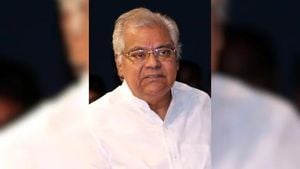Senator Ted Cruz (R-TX) has labeled a solar eclipse research initiative for kids as part of the "radical left’s woke nonsense." The senator, who chairs the Senate Commerce Committee, recently led an investigation suspecting the Biden administration of diverting billions from scientific research to advocates of diversity, equity, and inclusion (DEI). Cruz's claims are encapsulated in a report asserting $2 billion of the National Science Foundation’s budget has supposedly gone toward promoting ideologies he deems questionable.
Among those projects, Cruz targeted physicist Corinne Brevik’s live, interactive broadcast of the 2024 solar eclipse for middle school students. The initiative allowed students, especially those not within the path of totality, to observe the solar eclipse simultaneously with peers across the nation. "You can literally watch the kids watching the eclipse and hear the moment of 'Whoa!'" recounted Brevik. "It got a lot of kids who wouldn’t necessarily have had the chance to see it out to observe." Brevik emphasized her program aimed solely at education, stating, "The sole goal was to share what’s happening with everybody. It’s not propaganda; there’s no background agenda. Our goal is to help educate our youth."
The investigation, which Cruz touted, culminated in the release of a database listing over 3,400 NSF grants he claims are tainted by 'woke' ideology. Joshua Weitz, a biologist from the University of Maryland, criticized Cruz’s actions as "ludicrous," pointing out the importance of the flagged projects. "If one looks at this list, you find things we should absolutely be proud of funding," he stressed. Cruz's report alleged many grants, including those for solar eclipses or self-driving car safety, are linked to DEI initiatives and labeled them as "neo-Marxist class warfare propaganda."
Among those singled out by Cruz was Tammie Visintainer, who heads community-engaged science education at San Jose State University. Once alerted to her mention by Cruz, Visintainer was instructed by her dean to remain cautious of potential threats. "I found out via a text from my dean, who said 'Let me know if you're receiving any threats.' It was chilling and alarming," she shared. Her research focuses on extreme heat effects on diverse communities, and she pointed out, "The radical work being attacked is students walking around their community, collecting temperature data..."
The crux of Cruz's actions aligns with Donald Trump’s executive order aiming to dismantle DEI programs within federal institutions, which Cruz claims to be "illegal and immoral." His criticism of science funding makes waves where the fundamental integrity of scientific inquiry is being questioned. Concern for the direction of scientific funding looms large, as experts worry about the potential fallout from targeting NSF grants primarily for their supposed connections to DEI initiatives.
"What worries me is the intent to dismantle U.S. scientific leadership," Weitz remarked. The scientific community expresses fears this scrutiny and politicization of research funding will hinder progress. The overwhelming participation of scientists across varying fields has raised alarms about the long-term consequences of what Cruz and his supporters frame as necessary accountability. Corporations and institutions historically regarded for groundbreaking advancements now see their initiatives held up for scrutiny due to these claims, predominantly associated with ideological bias.
Brevik, Visintainer, and others targeted remain committed to their research agendas, focused on fostering scientific inquiry across various demographics. The pushback against Cruz’s accusations echoes widespread concern for maintaining the integrity and openness of U.S. scientific endeavors. By spotlighting exciting initiatives like Brevik’s eclipse broadcast, advocates argue for the fundamental right to educate the next generation without the specter of political vilification. With the 2024 solar eclipse on the horizon, many await to see how these discussions play out and what future support will follow for projects aimed at engaging younger audiences. Will these initiatives thrive, or will they continue to face the storm of political challenges?



